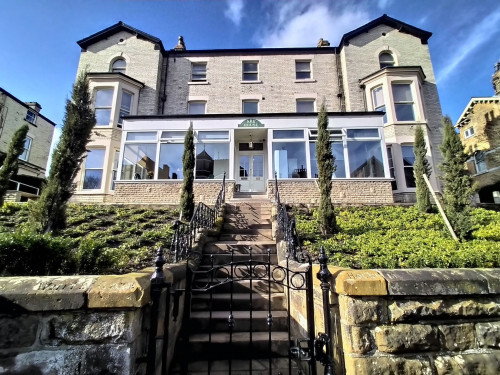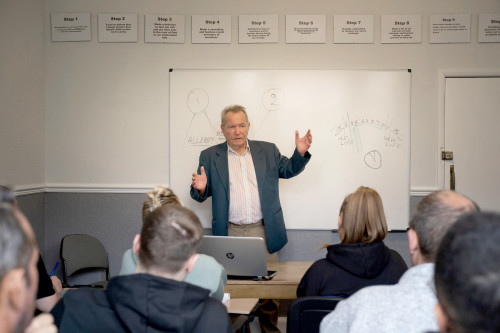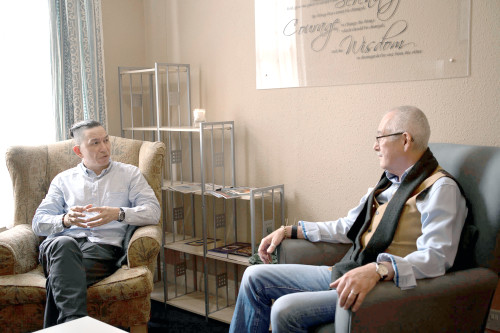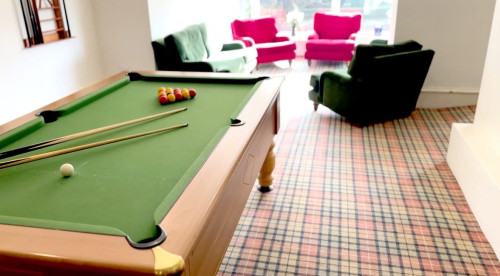






Ark House
Treatment Focus
This center primarily treats substance use disorders, helping you stabilize, create relapse-prevention plans, and connect to compassionate support.
Primary Level of Care
Offering intensive care with 24/7 monitoring, residential treatment is typically 30 days and can cover multiple levels of care. Length can range from 14 to 90 days typically.
Claimed
Recovery.com has connected directly with this treatment provider to validate the information in their profile.
Treatment Focus
This center primarily treats substance use disorders, helping you stabilize, create relapse-prevention plans, and connect to compassionate support.
Primary Level of Care
Offering intensive care with 24/7 monitoring, residential treatment is typically 30 days and can cover multiple levels of care. Length can range from 14 to 90 days typically.
Private Pay
You pay directly for treatment out of pocket. This approach can offer enhanced privacy and flexibility, without involving insurance. Exact costs vary based on program and length of stay. Contact the center for specific details.
Ark House
Ark House
About Ark House
Since 1993, Ark House have offered fully residential, abstinence-based treatment grounded in the 12-Step model at their serene, seaside facility. Their approach to the 12 Steps is non-religious, person-centred, and rooted in compassion, respect, and clinical integrity. The cost of treatment at Ark House can vary depending on the length of stay and individual client's needs.
Restorative Backdrop for Reflection and Growth
Located in coastal Scarborough, North Yorkshire, Ark House provides a tranquil setting just a short walk from the beach and town centre. Housed in a restored Edwardian hotel, Ark House combines historic charm with modern comfort. The 15-bedroom facility ensures safety and privacy, with gender-specific floors and thoughtfully arranged rooms that promote rest and a sense of belonging. Ark House has tailored its facilities to meet residents’ emotional, social, and practical needs, including:
- · Spacious communal lounge for group activities and relaxation
- · Kitchen and dining area for shared, home-cooked meals
- · Dedicated therapy rooms for sessions and counselling
- · Games area for recreational downtime
- · On-site laundry facilities
- · 24/7 staff presence with offices on-site
Every space at Ark House is designed to foster healing, connection, and a calm, supportive environment for sustainable recovery
Treatment for Alcohol, Drug, and Behavioural Addictions
Ark House serves clients seeking recovery from a wide range of alcohol, drug, and behavioural addictions. The substance addictions they treat include alcohol, prescription drugs, heroin, methadone, morphine, codeine, oxycodone, hydrocodone, fentanyl and other synthetic opioids, cocaine, crack cocaine, amphetamines, methamphetamine, prescription stimulants, cannabis (AKA "weed" or "marijuana"), synthetic cannabinoids such as Spice, benzodiazepines, LSD, psilocybin mushrooms, mescaline, peyote, DMT, ketamine, ecstasy, and MDMA. Additionally, they can treat polysubstance addiction.
12-Step Treatment with Respect and Clinical Integrity
Programmes at Ark House range from 6 weeks to 6 months and include group therapy, individual counselling with BACP-registered professionals, medication management, mindfulness practices, family involvement, and a peer-led therapeutic community. Their 12-Step model uses the Recovery Dynamics® by Joe McQuanty. Daily routines involve recovery assignments, therapeutic groups, and community responsibilities that foster stability and personal growth. Ark House uses the evidence-based talk therapy cognitive behavioural therapy (CBT) along with holistic treatments.
Detox Coordination
Although Ark House does not provide detox on-site, they coordinate with trusted medical partners for off-site, medically supervised detoxification prior to admission.
Aftercare for Long-Term Success
Ongoing support includes weekly aftercare groups, a 24/7 helpline, an alumni network, and one-to-one planning sessions, helping each individual maintain progress and build a life beyond treatment.
Center Overview
Treatment Focus
This center primarily treats substance use disorders, helping you stabilize, create relapse-prevention plans, and connect to compassionate support.
Pricing and Program Length
Estimated Center Costs
Center pricing can vary based on program and length of stay. Contact the center for more information. Recovery.com strives for price transparency so you can make an informed decision.
Levels of Care





Your Care Options
Specializations
Alcohol
Using alcohol as a coping mechanism, or drinking excessively throughout the week, signals an alcohol use disorder.
Drug Addiction
Drug addiction is the excessive and repetitive use of substances, despite harmful consequences to a person's life, health, and relationships.
Twelve Step
Incorporating spirituality, community, and responsibility, 12-Step philosophies prioritize the guidance of a Higher Power and a continuation of 12-Step practices.
Who We Treat
LGBTQ+
Addiction and mental illnesses in the LGBTQ+ community must be treated with an affirming, safe, and relevant approach, which many centers provide.
Men and Women
Men and women attend treatment for addiction in a co-ed setting, going to therapy groups together to share experiences, struggles, and successes.
Pregnant Women
Addiction and mental health treatment meets the clinical and psychological needs of pregnant women, ensuring they receive optimal care in all areas.
Approaches
Holistic
A non-medicinal, wellness-focused approach that aims to align the mind, body, and spirit for deep and lasting healing.
Therapeutic Community
Therapeutic communities allow patients to contribute to the success and progress of their community, through healthy behaviors or even basic chores.
Twelve Step
Incorporating spirituality, community, and responsibility, 12-Step philosophies prioritize the guidance of a Higher Power and a continuation of 12-Step practices.
Therapies
1-on-1 Counseling
Patient and therapist meet 1-on-1 to work through difficult emotions and behavioral challenges in a personal, private setting.
Meditation & Mindfulness
A practiced state of mind that brings patients to the present. It allows them to become fully aware of themselves, their feelings, and the present moment.
Family Therapy
Family therapy addresses group dynamics within a family system, with a focus on improving communication and interrupting unhealthy relationship patterns.
Psychoeducation
This method combines treatment with education, teaching patients about different paths toward recovery. This empowers them to make more effective decisions.
Twelve Step Facilitation
12-Step groups offer a framework for addiction recovery. Members commit to a higher power, recognize their issues, and support each other in the healing process.
Substances We Treat
Alcohol
Using alcohol as a coping mechanism, or drinking excessively throughout the week, signals an alcohol use disorder.
Benzodiazepines
Benzodiazepines are prescribed to treat anxiety and sleep issues. They are highly habit forming, and their abuse can cause mood changes and poor judgement.
Cocaine
Cocaine is a stimulant with euphoric effects. Agitation, muscle ticks, psychosis, and heart issues are common symptoms of cocaine abuse.
Drug Addiction
Drug addiction is the excessive and repetitive use of substances, despite harmful consequences to a person's life, health, and relationships.
Ecstasy
Ecstasy is a stimulant that causes intense euphoria and heightened awareness. Abuse of this drug can trigger depression, insomnia, and memory problems.
Heroin
Heroin is a highly addictive and illegal opioid. It can cause insomnia, collapsed veins, heart issues, and additional mental health issues.
Psychedelics
Hallucinogenic drugs—like LSD—cause euphoria and increased sensory experiences. When abused, they can lead to depression and psychosis.
Methamphetamine
Methamphetamine, or meth, increases energy, agitation, and paranoia. Long-term use can result in severe physical and mental health issues.






